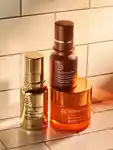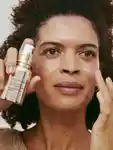There are certain areas of life where the help of an expert can be indispensable. Whether it be that niggling noise your car keeps making (reminder to self: call the mechanic) or the curtain bangs you’re tempted to cut yourself (put down the scissors!). Another one on the list – skincare. While yes, you can do it alone, nothing quite beats a qualified opinion. And when it comes to skincare, Dr Dennis Gross is as qualified as it gets. A practising dermatologist, formula innovator, Dr Gross is a veritable wealth of knowledge on all things skin.
And even better – the Dr. Dennis Gross skincare range brings his clinical expertise to you at home, without the need for an appointment at his ever-popular New York clinic (where you might spot clients like Selena Gomez and Zoë Kravitz).

“Essentially all functions of the skin are diminished as we age. Specifically, the top things that happen are we lose collagen – it gets broken down and made with less efficiency – and our moisture barrier becomes impaired, which is why people tend to start getting drier skin. The sun exposure we had years ago also starts to come out as we get older, as there’s a delayed latency period.
“In terms of what’s visible, you start to see things like more sunspots, fine lines and wrinkles, as well as the deepening of grooves and sagging skin. On top of this, our skin can start to look more dull and less radiant, because of the weakening of the moisture barrier, and redness can become a concern.”

“With our skincare, we're really trying to increase the results you see at home by bringing you technology that in the past has been reserved only for the clinic.”
Dr Dennis Gross
“To update your skincare routine as you age, you want to start to build collagen in as many ways as you can while also really taking more care of your moisture barrier (and wearing sunscreen, of course!). You need to understand that there are certain fundamental ingredients that are proven to work – these are the rockstars of skincare! Think: alpha and beta hydroxy acids, retinol, vitamin C, LED and niacinamide.
“You should start to build a regimen that adds more and more of these great ingredients to your skin. I don't like saying ‘you should use retinol in your twenties’ and so on, but rather that you should start layering more as you get older and customise it for yourself.”
“With our skincare, we're really trying to increase the results you see at home by bringing you technology that is next level and that in the past has been reserved only for the clinic. We're making these steps in clinical skincare by developing delivery systems, as well as new ingredients that we're finding that can make a difference.
“What's crucial is the process and the method that we use. After we come up with these ideas and have created these products, we now have to test them and prove that they work. And that isn't just asking the consumer, ‘How much better does your skin look?’ We're using instrumentation that tests the subject's hydration levels, levels of collagen, density. We don't just trust it; we test it.”
“In my practice, people come in for fillers all the time. Injectables by definition are going to work deeper in the skin, because the needle delivers them deeper. In order to get similar effects from a skincare product, you have to break down what it is that fillers are really doing – and that’s increasing volume three dimensionally.
“For a skincare product to do something like that without the needle, you now have to come at it by plumping the skin, filling and firming the skin, and repairing the skin. You need ingredients that do all the above and a delivery system that optimises the penetration and absorption of these ingredients, too.”

“That’s exactly what the DermInfusions™ 3D Visible Fill + Repair Serum does. First, it’s an ingredient story. We’ve got four different molecular weights of hyaluronic acid, which allows for the different sizes to go deeper and deeper into the skin. Then there’s four different peptides, all of which are used to build collagen for a firming effect.
“The next frontier is the moisture barrier. It’s that very top layer of skin that seals in the moisture and optimises the benefits of all the other ingredients, because you want hydration to be sealed in and you want to increase internal hydration. For that, we use niacinamide and ectoin. Ectoin is an adaptogen that is used in nature, and in skin, it helps to fortify the moisture barrier.
“Finally, what makes this really unique is the delivery system – our MicroCelle Delivery™ system reduces the molecular size of the water that carries active ingredients so that they can be better absorbed by the skin, based on the same micellar technology you might be familiar with in cleansers.”

“I always like to focus on the moisture barrier, and I think it’s one of those areas that consumers are becoming more knowledgeable of. We've always been into education and explanation with our brand, and now I think they're on board as well. And I think things like dryness, redness and irritation are starting to be attributed to their moisture barrier and the use of harsh products.
“Take retinol, which in some forms is known to be harsh. We did our research and said, what is it exactly about retinol that makes it harsh? The answer is that it was causing injury to their moisture barrier. So as a remedy, in our formulas we added bakuchiol and ferulic acid, so that it protects the moisture barrier and allows people to use retinol with less risk of irritation.
“One of the remedies that's come up in our culture is to say oh, let's start to cycle. In my opinion, skin cycling really is a disservice because it's telling people to use products that are designed to be used every day every other day instead, so you get suboptimal results. Then the irritation that product caused meant other products that were tolerated before now can't be, so then they start to cycle those as well, and we're spiralling downward. All of that connects back to the reason that the moisture barrier has come centre stage and brings awareness to it.”







